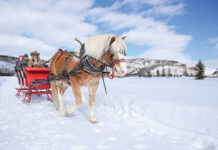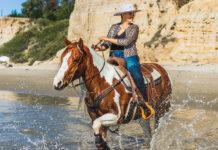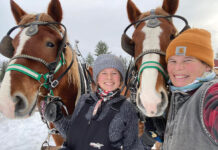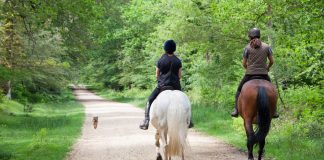There are a lot of tiresome debates in the horse world. Bit vs. bitless. Shod vs. barefoot. 24-hour turnout vs. part-time stabling. The answer to all of these debates is “Work with your veterinarian (or farrier or other relevant professional) to determine what’s best for your horse.” I feel like we could end it there.

Blanketing is a surprisingly heated issue in the horse world. You would think this is something where the non-blanketers could just quietly laugh at the blanketers who spend a lot of money on horse clothes and then fret all winter about which weight is the right one to use. Alas, that’s not always what happens. People get really inflammatory about blankets, accusing blanketers of messing with nature. Or something.
Officially here at Horse Illustrated HQ, we take a pretty neutral stance. You’ve heard this one: If your horse is unclipped and has access to hay and shelter, he probably doesn’t need a blanket, no matter how cold it gets. If you choose to body clip him, you should probably blanket him when it’s cold, windy or wet in the winter. If your situation falls somewhere in between those two scenarios, well, work with your veterinarian to determine what’s best for your horse.
Perhaps you’ve seen this blog post by David Ramey, DVM, an equine vet who has gained quite a following for his blunt takedowns of frivolous horse care practices. His stance is pretty much that no horse needs a blanket. Ever. Well, he makes an exception for a hypothetical bodyclipped horse who lives outside in January. In Finland. Additionally, he points out that if a horse gets wet, say from sweat or from rain leaking in, the blanket will prevent moisture from evaporating, ultimately leaving your horse wetter and colder than his unblanketed brethren.
Yeah, he’s probably right. I’m going to keep blanketing my horse anyway.
I’ve always considered myself a blanketing minimalist. I’ve put Snoopy’s on when cold weather is coupled with wind or rain/ice, or in case of polar-vortex-type temperatures, but that’s it. I board at an eventing-focused stable, which means most of Snoopy’s neighbors are Thoroughbred-types who are at least partially clipped as their training continues through the winter, so blankets abound. There have been days where he (and the local Haflinger) have been the only ones going au naturel.

Blankets aren’t necessary, says Snoopy. In fact, he tells me horses are most able to self-regulate their temperature if they have access to free-choice carrots.
That changed a bit this year. Historically an easy keeper, Snoopy’s weight is less than ideal for the first time in his entire life, to the point that my vet recently told me I should start feeding him more grain (he’s been on just “a handful” along with his joint supplement* for many years.) And he’s old. He gets plenty of hay and he has shelter in his field, but on a day like today, when the air temperature is below zero and the wind is gusting, I can’t help but feel like I’m doing the right thing by keeping the blanket on. That goes double when there’s freezing rain happening.
Dr. Ramey anticipated this sort of reaction. See the last two paragraphs of his post.
Maybe Snoopy could take or leave his clothes, but I DO feel better when my old guy is wearing his blanket, so if it’s cold and wet or the temperature is below freezing, he’s going to be in his blanket. When I’m at home at night listening to ice pelt the windows, that peace of mind—even if it’s misguided—is worth it. Take your best shot, blanket-haters on Facebook. I just don’t care.
*Dr. Ramey also has an interesting post about why equine supplements are unnecessary. I agree with all of it…and yet, my horse will likely be on his until the day he dies.
Back to The Near Side
Leslie Potter is Sr. Associate Web Editor of horseillustrated.com. Follow her on Twitter: @LeslieInLex.






I completely understand and agree with the no blanketing theory. That said, I will always blanket my horse. Why? He ( as a racing OTTB) was blanketed his entire life, starting out as a foal up state NY farm mid winter (think 10 to 20 below zero). After his short racing career, he came to me at 3. He never really grew a coat. Odd, but true. I waited and waited and the first few years I had him, he was silky smooth all winter. He therefore was blanketed. Recently, he has managed to grow a great coat and is blanketed less and less with the changes as he ages. I love the idea of making him comfortable in the below zero temperatures (tonight -30 with the wind chill) and in the pelting sleet and rain. He seems comfortable, and I take care to ensure he does not overheat. Do I think that this is necessary for his survival? No, I think it’s helpful, a kindness in the brutal winter. Do I care what anyone else thinks? Nope.
I totally agree with Dr Ramey’s opinion and now on to the next question, what weight should the blanket be?
I blanket my horse when it is 10 degrees or below. He seems to appreciate the extra help to keep warm. It also helps them keep their weight up when they are older.
I agree with Dr. Ramey for the most part. When we moved from LA to NE PA he told me that horses do not even feel cold until it is 20 degrees. So when the temp dropped to 20, I dutifully blanketed both of them. Every night for a week I put on their blankets. Every morning for a week I found the blankets were on the ground, both fully buckled. I don’t know if they helped each other take those blankets off, but after a week I stopped blanketing them. They had a barn to go into if they wanted.
Now that we are back in LA (my horses could take the weather, but I couldn’t) and my mare is now 33 and thinner than she used to be, I throw a blanket on her on those odd nights when it falls to 40. When it rains she goes into a fully covered stall. I know she probably doesn’t need a blanket but I am the kind of horse Mom who would bring them in my house on a cold or rainy night if I could.
I agree with you. I blanket my2 year old 1/2 Arab, 1/2 Oldenburg overrnight, only when it’s really cold & windy. Off when sun out & temperature up. So far he’s only had his blanket on twice, has never grown a winter coat..
I live in a desert climate and blanketing isn’t strictly necessary in my area where it’s rather normal to get a 60 degree high in January. However, the subject is a topic for heated debate here as well. I fall right in line with Leslie. Besides my 32 yr old gelding, who doesn’t get much of a hair coat and is a hard keeper (he is blanketed every night), my horses are only blanketed if it’s rainy and/or windy at night with a light-weight waterproof blanket
Why not let the horse tell his or her preference? http://www.thehorse.com/articles/34718/study-horses-can-communicate-blanketing-preferences
Rose, I saw that study and it is very intriguing! I wonder if anyone outside of the research environment has been able to train their horse to communicate about blankets that way. It’d be worth a try.